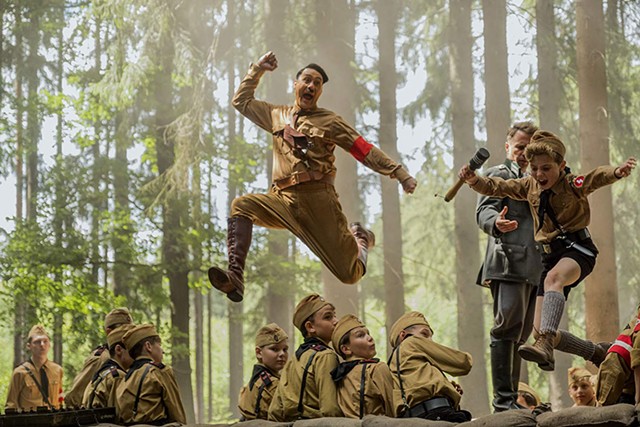
- WAR CHILD Waititi and Davis make an odd but compelling couple in the filmmaker’s inspired anti-hate fable.
It really is a small world after all. Disney has turned it into a theme park. Comic Book has been adopted as the universal language. Everywhere human beings of every background flock to watch the same superhero blockbusters. For talented filmmakers, the brass ring these days isn't getting the chance to make their dream project, but becoming a faceless cog in the Marvel machine. When I read in 2016, for example, that Hunt for the Wilderpeople director Taika Waititi's next film would be Thor: Ragnarok, I was crushed. Another one bites the dust, I figured.
I'm happy to report I figured wrong. Waititi is the first auteur I know of to hit the Marvel jackpot and then return to his indie roots. Jojo Rabbit is a picture Disney wouldn't touch with a 10-foot pole, as idiosyncratic as anything the exuberantly idiosyncratic director has ever done.
Roman Griffin Davis is fabulous as Jojo Betzler, a 10-year-old who lives with his mother (Scarlett Johansson) in the fictional German village of Falkenheim toward the end of the Second World War. His sister has died, and his father is fighting in Italy. Since his mother leaves the home to work most days, Jojo can get lonely. Under the circumstances, we can see why he might dream up an imaginary pal and why, needing a father figure, he might make that pal the leader of the fatherland himself, Adolf Hitler (Waititi). The kid's 10, after all, and impressionable.
Jojo's background also explains why, as the film opens, he's psyched to get to his first day at Hitler Youth camp. As an inspired music cue for the sequence, Waititi chooses a recording I've never heard on a soundtrack before — the Beatles' "Komm, Gib Mir Deine Hand" (the German-language version of "I Want to Hold Your Hand"). It works like a charm, and the first third of the movie maintains that level of invention, humor and creative energy.
A big assist comes courtesy of Sam Rockwell, who's phenomenal as the camp's gone-to-seed commandant, Capt. K. Rebel Wilson does solid comic work as Fräulein Rahm, a counselor who brainwashes girls into believing that having babies is the best way for them to help win the war.
The early scenes are madly entertaining, even when Waititi, dressed as the Führer, joins Jojo at the camp to offer comfort after the other kids taunt the boy for refusing to kill a bunny. I know. I was initially put off by the goofy Hitler gimmick, too, but I have to say the writer-director-actor makes it work. There's even a highly satisfying Quentin Tarantino-esque touch at the end.
In between, the picture downshifts into a less zany, more emotionally affecting gear. Jojo discovers his mother is hiding a young Jewish woman in the house. She's played by Thomasin McKenzie, who was equally wonderful in 2018's Leave No Trace. Over an hour or so, we watch the boy shed prejudices and gradually forge a flesh-and-blood friendship to supplant his fantasy one. There's a great scene involving a visit from the Gestapo (featuring a fiendishly funny Stephen Merchant) in which Waititi upends any number of World War II film conventions.
Speaking of musical cues, the one that closes the film is as inspired as the one that opened it. Jojo Rabbit will make many viewers think of Wes Anderson with its stylized look, quirky sensibility and savvy use of pop tunes. Isn't that way better than making them think of Thor?










Comments
Comments are closed.
From 2014-2020, Seven Days allowed readers to comment on all stories posted on our website. While we've appreciated the suggestions and insights, right now Seven Days is prioritizing our core mission — producing high-quality, responsible local journalism — over moderating online debates between readers.
To criticize, correct or praise our reporting, please send us a letter to the editor or send us a tip. We’ll check it out and report the results.
Online comments may return when we have better tech tools for managing them. Thanks for reading.